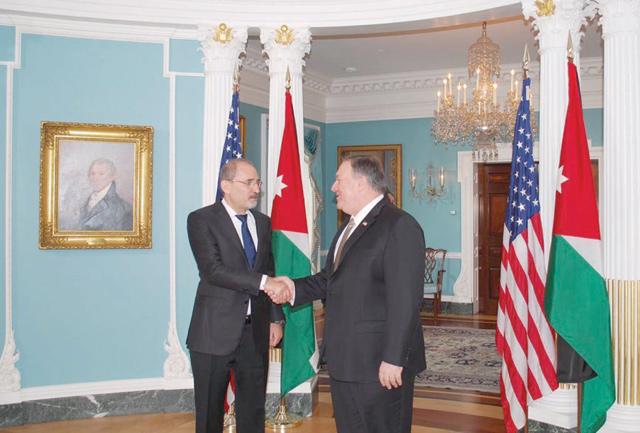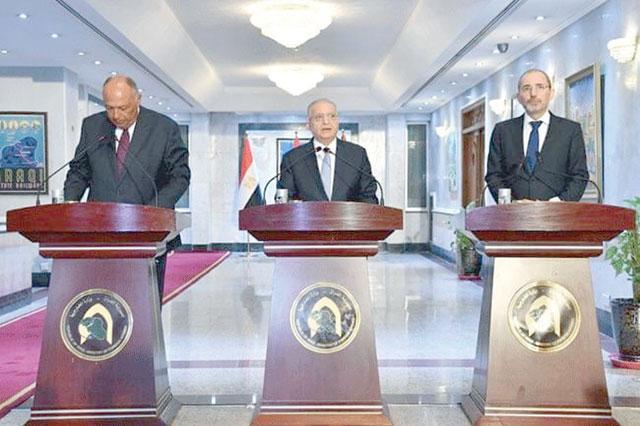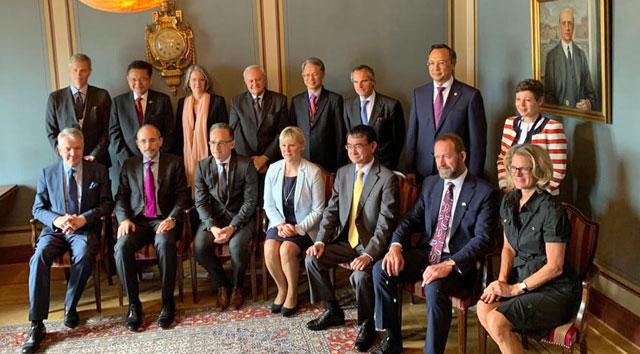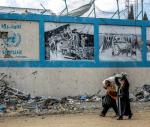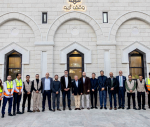You are here
Syrian Constitutional Committee’s success vital to political solution — FM
By JT - Nov 15,2019 - Last updated at Nov 16,2019

Foreign Minister Ayman Safadi poses for a group photo during a meeting with the Small Group on Syria, hosted by US Secretary of State Mike Pompeo on Thursday (Photo courtesy of Foreign Ministry)
AMMAN — Foreign Minister Ayman Safadi on Thursday stressed the importance of supporting the success of the Syrian Constitutional Committee as a vital step towards reaching a political solution to the crisis, one which will maintain the country’s territorial integrity, unity and restores its security and stability.
During a meeting with the Small Group on Syria, hosted by US Secretary of State Mike Pompeo, Safadi reiterated the importance of securing humanitarian aid to Syrians and the areas of Syria that are most in need, especially in the south, highlighting the need for continuous support to countries that host refugees, according to a Foreign Ministry statement.
Safadi affirmed that reaching a political solution to the crisis is a necessity for regional stability and security, and is a prerequisite to defeating terrorism.
During his participation in the Global Coalition Against Daesh’s Small Group meeting, Safadi noted that Jordan will remain an effective member of the coalition and will continue to play its role in the war against terror.
“Even though the Daesh terror group has lost its territorial control over Syria and Iraq, it still poses a security and ideological threat that must be faced with comprehensive group efforts,” Safadi said.
The minister pointed to the significance of the Aqaba Meetings, launched by His Majesty King Abdullah, as a platform for the unification of efforts to create a holistic counterterrorism approach.
Safadi underlined that eliminating terrorism requires the presence of policy to resolve regional crises.
“Iraq has made great strides and sacrifices to abolish Daesh gangs, and now requires the international community to stand by its side to rebuild and embed stability in the country,” the minister said.
He underscored the importance of the US’ success in killing Abu Bakr Al Baghdadi as a “great achievement “ in the war against terror.
Also on Thursday, Safadi held a trilateral meeting with his Egyptian counterpart, Sameh Shukri and Iraqi counterpart Mohammed Ali Hakim, during which they discussed ways of enhancing cooperation.
The ministers agreed to hold their next meeting in Amman to draft a roadmap for translating leadership directives into the institutionalisation of economic cooperation and trilateral coordination.
Safadi and his counterparts also addressed ways to resolve regional crises and achieve regional security and stability.
Safadi also met with his Turkish counterpart, Mouloud Gawishoglu, as the two sides discussed the continuation of bilateral efforts to enhance cooperation, and regional developments pertaining to Palestine and Syria.
The ministers agreed on the importance of intensifying efforts towards a political solution to the Syrian crisis, which maintains the country’s territorial unity, cohesion and stability.
Safadi and Gawishoglu reiterated the centrality of the Palestinian cause, noting that there are no alternatives to a two-state solution, which guarantees the establishment of an independent Palestinian state along the June 4, 1967 lines with East Jerusalem as its capital, as the only solution to the conflict.
They underscored continued coordination towards the protection of the Holy City and its Muslim and Christian sites, as well as the preservation of its historical and legal status quo.
Safadi also held talks with Swedish Foreign Minister Ann Linde and agreed to continue bilateral cooperation to support UNRWA and secure the funds it needs to continue its UN-mandated role.
In a meeting with Italian Foreign Minister Luigi Di Maio, the two officials discussed bilateral cooperation and regional developments, and agreed to continue coordination towards the expansion of economic and investment cooperation.
Safadi also discussed bilateral relations and regional issues with his French, Finnish, Libyan and New Zealander counterparts.
Related Articles
AMMAN — Jordan will remain on the forefront of international efforts aiming to defeat the Daesh terror group, whether on the military or the
AMMAN — Iraqi President Barham Saleh on Sunday hosted Foreign Minister Ayman Safadi on the sidelines of a trilateral ministerial meeting hel
AMMAN — No economic proposition can replace a political resolution to the occupation of Palestine, one that is founded on the basis of the t


